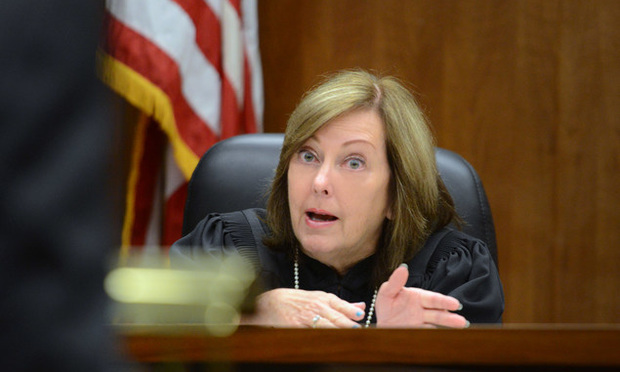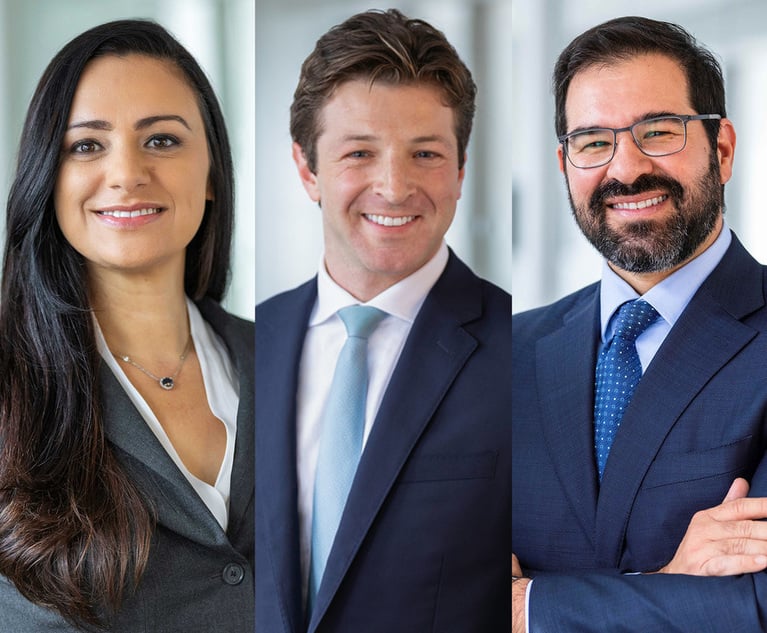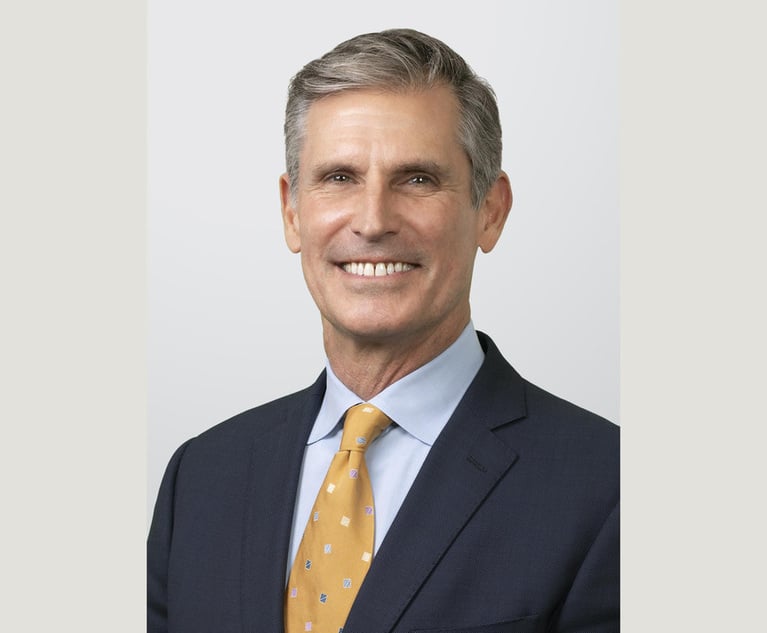South Florida Attorney Called as Witness in Own Client's Case
A personal injury lawsuit against a Florida law firm and its employee is headed back to trial, after the Fourth District Court of Appeal ruled that evidence of financial ties between the plaintiffs lawyer and treating physician shouldn't have been allowed into evidence.
March 07, 2019 at 04:43 PM
5 minute read
 Fourth DCA Judge Melanie May wrote the opinion Wednesday, finding that the trial court erred in permitting a Florida law firm to use evidence protected by attorney-client privilege. Photo: Melanie Bell/ALM.
Fourth DCA Judge Melanie May wrote the opinion Wednesday, finding that the trial court erred in permitting a Florida law firm to use evidence protected by attorney-client privilege. Photo: Melanie Bell/ALM.
When defense counsel Matthew A. Fiorello announced he'd be bolstering his case with records of payments between plaintiff counsel Lauri J. Goldstein and her client's treating physician, Goldstein objected.
But Martin Circuit Judge William L. Roby kept them in play, triggering a series of events that saw Goldstein become a witness against her own client midway through trial.
One juror was struck during voir dire, according to an appellate court opinion issued Wednesday, after saying it would be foolish not to question Goldstein's credibility as a witness, since “she knows too much.” But when the plaintiff moved for a mistrial, the judge wouldn't budge.
Goldstein was deposed, compelled to testify about her trust account, as well as personal relationships and payments to doctors connected with her firm, then had to leave the courtroom as any witness would.
She described the experience as “chilling.”
“I was in shock,” Goldstein said. “I wanted to cooperate with the judge. I respect the judiciary. But having to walk out of the courtroom after the jury was called, it was unsettling for me, it was unsettling for the client.”
Goldstein has practiced for more than 30 years, and said she's never had an experience like it.
“Thank goodness I had co-counsel there,” she said.
Law Firm as Co-Defendant
The trial revolved around James Menendez, office manager at the Crary Buchanan law firm in Stuart.
Menendez, who had hit bicyclist Frank Bellezza with a car owned by the firm, faced allegations of negligence and vicarious liability. Bellezza claimed he'd been walking his bicycle down the street and suffered serious neck and back injuries. He sued both Menendez and the law firm that owned the vehicle.
A jury found the driver negligent but only 42.5 percent at fault, leaving the rest of the blame with the plaintiff and awarding $20,000 in damages. Bellezza's medical bills cost more than $184,000, according to the opinion.
But the Fourth District Court of Appeal ordered a retrial, finding that allowing into evidence payment records between Goldstein's firm and plaintiff's physicians “created insurmountable prejudice” against Bellezza.
Information about lawyer-doctor links has been a no-go since 2017, when the Florida Supreme Court ruled in Worley v. Central Florida Young Men's Christian Association that it was protected by attorney-client privilege.
Related story: 'Worley': Its Impact on Doctor Referrals and the Attorney-Client Privilege
The appellate court also found Goldstein wasn't the only person qualified to speak about the financial records at trial.
“In short, she was forced to prejudice her own client,” the opinion said.
This issue was the central focus of the defendant's case, continuously raised from opening to closing, according to the opinion, which pointed out that jurors even asked about the attorney's relationship with the doctor while deliberating.
Defense attorney Fiorello declined to comment on the opinion but said he plans to go forward with the underlying case, and believes jurors were swayed by the plaintiff's testimony, not the doctor referral evidence.
At trial, Fiorello argued that his client looked both ways before turning right out of an intersection and that the plaintiff was unlawfully riding his bicycle on the sidewalk, not walking it as he'd claimed.
Read the court order:
The plaintiff also argued that the court discarded similar financial evidence involving the law firm. The court agreed, but declined to address the issue to preserve attorney-client privilege.
Fourth DCA Judge Melanie G. May wrote the opinion, backed by Judges Robert M. Gross and Dorian K. Damoorgian.
Appellate counsel to Menendez and the firm, Carri Leininger of Williams, Leininger & Cosby in North Palm Beach, did not respond to a request for comment before deadline.
Bellezza's appellate lawyer Margaret M. Bichler said the case presented some critical issues for all personal injury plaintiffs in Florida.
“The jury was incredibly prejudiced,” Bichler said. “I don't think they were even capable of looking at the case fairly after all of the evidence that was admitted came in.”
Medical bills and trust account payments between physicians and attorneys are common practice, Bichler pointed out, but to a layperson that can sometimes appear “sinister.”
“Thankfully the court took this very seriously and wrote a very thorough opinion,” Bichler said. “Mr. Bellezza's right to a fair trial has been restored, and hopefully this will never be an issue again for other plaintiffs.”
Related stories:
Kubicki Draper Beats Insurance Company's Malpractice Suit
Lawyers in Stormy Daniels Case Battle Over Attorney-Client Privilege
This content has been archived. It is available through our partners, LexisNexis® and Bloomberg Law.
To view this content, please continue to their sites.
Not a Lexis Subscriber?
Subscribe Now
Not a Bloomberg Law Subscriber?
Subscribe Now
NOT FOR REPRINT
© 2025 ALM Global, LLC, All Rights Reserved. Request academic re-use from www.copyright.com. All other uses, submit a request to [email protected]. For more information visit Asset & Logo Licensing.
You Might Like
View All
Florida Judge Denies Motion to Dismiss in $150M Plane Crash Lawsuit Involving Flow La Movie
3 minute read

Holland & Knight Expands Corporate Practice in Texas With Former Greenberg Traurig Partner
3 minute read
Forum Clause Axes $844M Case Against Reinsurer Over Deadly Plane Crash, Judge Rules
Trending Stories
- 1Munger, Gibson Dunn Billed $63 Million to Snap in 2024
- 2January Petitions Press High Court on Guns, Birth Certificate Sex Classifications
- 3'A Waste of Your Time': Practice Tips From Judges in the Oakland Federal Courthouse
- 4Judge Extends Tom Girardi's Time in Prison Medical Facility to Feb. 20
- 5Supreme Court Denies Trump's Request to Pause Pending Environmental Cases
Who Got The Work
J. Brugh Lower of Gibbons has entered an appearance for industrial equipment supplier Devco Corporation in a pending trademark infringement lawsuit. The suit, accusing the defendant of selling knock-off Graco products, was filed Dec. 18 in New Jersey District Court by Rivkin Radler on behalf of Graco Inc. and Graco Minnesota. The case, assigned to U.S. District Judge Zahid N. Quraishi, is 3:24-cv-11294, Graco Inc. et al v. Devco Corporation.
Who Got The Work
Rebecca Maller-Stein and Kent A. Yalowitz of Arnold & Porter Kaye Scholer have entered their appearances for Hanaco Venture Capital and its executives, Lior Prosor and David Frankel, in a pending securities lawsuit. The action, filed on Dec. 24 in New York Southern District Court by Zell, Aron & Co. on behalf of Goldeneye Advisors, accuses the defendants of negligently and fraudulently managing the plaintiff's $1 million investment. The case, assigned to U.S. District Judge Vernon S. Broderick, is 1:24-cv-09918, Goldeneye Advisors, LLC v. Hanaco Venture Capital, Ltd. et al.
Who Got The Work
Attorneys from A&O Shearman has stepped in as defense counsel for Toronto-Dominion Bank and other defendants in a pending securities class action. The suit, filed Dec. 11 in New York Southern District Court by Bleichmar Fonti & Auld, accuses the defendants of concealing the bank's 'pervasive' deficiencies in regards to its compliance with the Bank Secrecy Act and the quality of its anti-money laundering controls. The case, assigned to U.S. District Judge Arun Subramanian, is 1:24-cv-09445, Gonzalez v. The Toronto-Dominion Bank et al.
Who Got The Work
Crown Castle International, a Pennsylvania company providing shared communications infrastructure, has turned to Luke D. Wolf of Gordon Rees Scully Mansukhani to fend off a pending breach-of-contract lawsuit. The court action, filed Nov. 25 in Michigan Eastern District Court by Hooper Hathaway PC on behalf of The Town Residences LLC, accuses Crown Castle of failing to transfer approximately $30,000 in utility payments from T-Mobile in breach of a roof-top lease and assignment agreement. The case, assigned to U.S. District Judge Susan K. Declercq, is 2:24-cv-13131, The Town Residences LLC v. T-Mobile US, Inc. et al.
Who Got The Work
Wilfred P. Coronato and Daniel M. Schwartz of McCarter & English have stepped in as defense counsel to Electrolux Home Products Inc. in a pending product liability lawsuit. The court action, filed Nov. 26 in New York Eastern District Court by Poulos Lopiccolo PC and Nagel Rice LLP on behalf of David Stern, alleges that the defendant's refrigerators’ drawers and shelving repeatedly break and fall apart within months after purchase. The case, assigned to U.S. District Judge Joan M. Azrack, is 2:24-cv-08204, Stern v. Electrolux Home Products, Inc.
Featured Firms
Law Offices of Gary Martin Hays & Associates, P.C.
(470) 294-1674
Law Offices of Mark E. Salomone
(857) 444-6468
Smith & Hassler
(713) 739-1250






